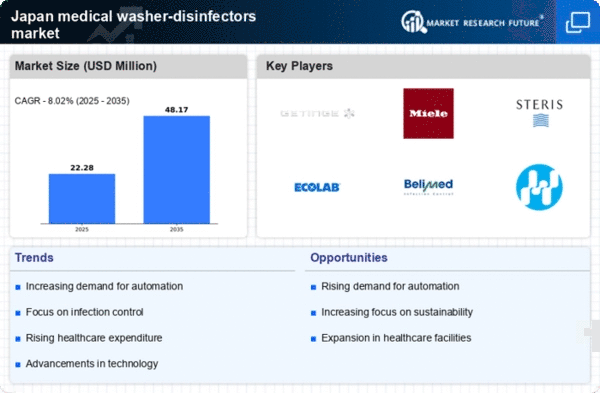Aging Population
Japan's demographic shift towards an aging population significantly influences the medical washer-disinfectors market. With approximately 28% of the population aged 65 and older, the demand for healthcare services is escalating. This demographic trend necessitates enhanced medical facilities equipped with advanced sterilization technologies. As older adults typically require more medical attention, hospitals are compelled to ensure that their instruments and equipment are thoroughly disinfected. The medical washer-disinfectors market is likely to benefit from this trend. Healthcare providers seek to improve their infection control measures and patient care standards, driving the adoption of these essential devices.
Focus on Infection Control
The heightened focus on infection control within healthcare settings is a critical driver for the medical washer-disinfectors market. In Japan, healthcare facilities are prioritizing stringent infection prevention protocols to safeguard patient health. This emphasis on hygiene has led to increased investments in disinfection technologies, including washer-disinfectors. As hospitals aim to reduce hospital-acquired infections (HAIs), the demand for effective cleaning and disinfection solutions is likely to rise. The medical washer-disinfectors market is expected to experience growth as healthcare providers recognize the importance of maintaining high standards of cleanliness and safety in their operations.
Increasing Healthcare Expenditure
The rising healthcare expenditure in Japan is a pivotal driver for the medical washer-disinfectors market. As the government allocates more funds towards healthcare services, hospitals and clinics are likely to invest in advanced medical equipment, including washer-disinfectors. In 2025, Japan's healthcare spending is projected to reach approximately ¥42 trillion, reflecting a growth of around 5% from previous years. This increase in budget allows healthcare facilities to upgrade their sterilization processes, ensuring compliance with stringent hygiene standards. Consequently, the demand for efficient and reliable medical washer-disinfectors is expected to surge, as these devices play a crucial role in maintaining patient safety and operational efficiency.
Technological Integration in Healthcare
The integration of advanced technologies in healthcare is a significant driver for the medical washer-disinfectors market. Innovations such as IoT-enabled devices and automated systems enhance the efficiency and effectiveness of disinfection processes. In Japan, hospitals are increasingly adopting smart technologies to streamline operations and improve patient outcomes. The market for medical washer-disinfectors is projected to grow as facilities seek to incorporate these technologies into their workflows. By 2025, the adoption of automated washer-disinfectors is expected to rise by approximately 15%, reflecting a shift towards more sophisticated and reliable disinfection solutions that meet the evolving needs of healthcare providers.
Rising Awareness of Environmental Sustainability
The growing awareness of environmental sustainability among healthcare providers is influencing the medical washer-disinfectors market. In Japan, there is a notable shift towards eco-friendly practices, prompting hospitals to seek disinfection solutions that minimize environmental impact. This trend is reflected in the increasing demand for washer-disinfectors that utilize less water and energy while maintaining high disinfection standards. As healthcare facilities strive to align with sustainability goals, the market for medical washer-disinfectors is likely to expand, driven by the need for efficient, environmentally responsible cleaning technologies that support both patient safety and ecological preservation.





















Leave a Comment